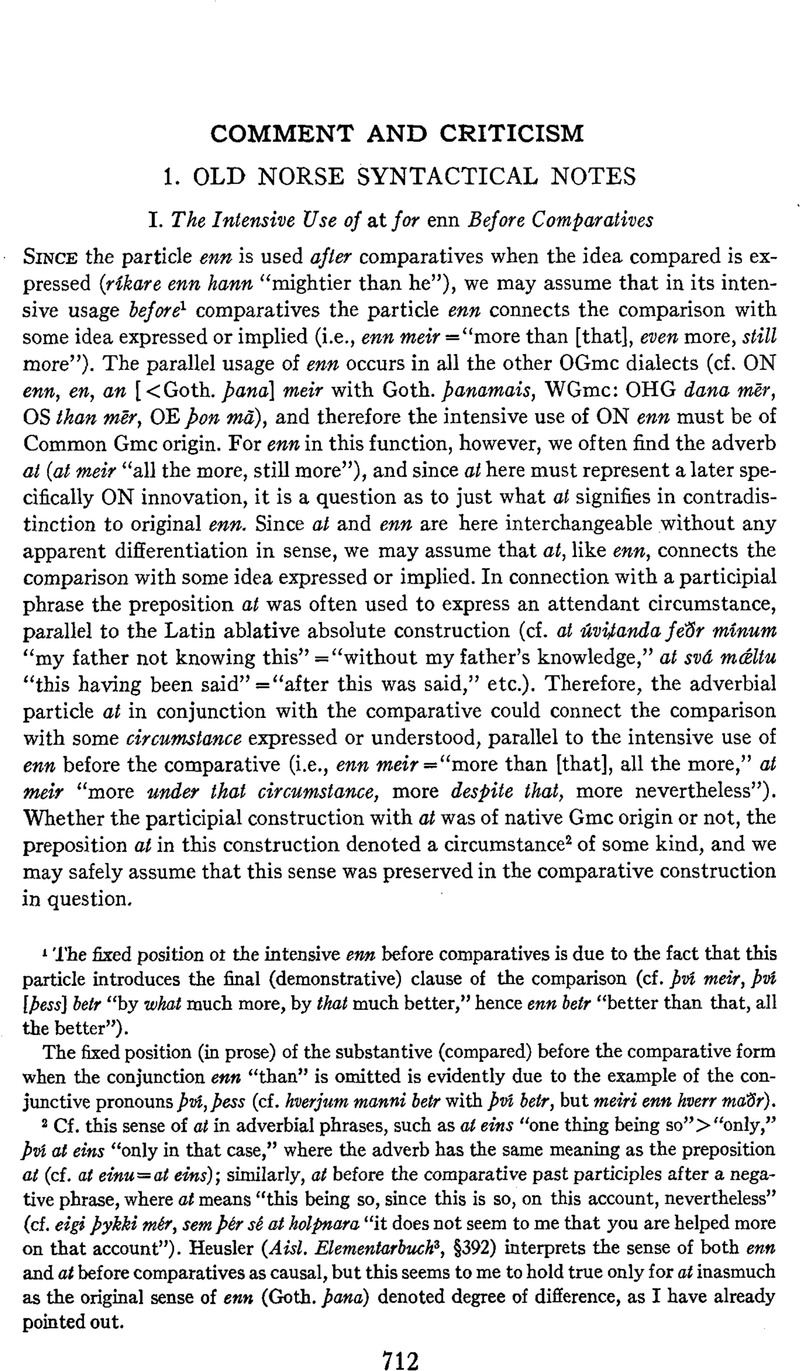No CrossRef data available.
Article contents
Old Norse Syntactical Notes
Published online by Cambridge University Press: 02 December 2020
Abstract

- Type
- Comment and Criticism
- Information
- Copyright
- Copyright © Modern Language Association of America, 1948
References
1 The fixed position of the intensive enn before comparatives is due to the fact that this particle introduces the final (demonstrative) clause of the comparison (cf. pvi meir, pví [bess] belr “by what much more, by that much better”, hence enn betr “better than that, all the better”).
The fixed position (in prose) of the substantive (compared) before the comparative form when the conjunction enn “than” is omitted is evidently due to the example of the conjunctive pronouns pvi,pess (ci. hverjum manni betr with pví betr, but meiri enn hverr mar).
2 Cf. this sense of at in adverbial phrases, such as at eins “one thing being so” > “only”, pví at eins “only in that case”, where the adverb has the same meaning as the preposition at (cf. at einu=at eins); similarly, at before the comparative past participles after a negative phrase, where at means “this being so, since this is so, on this account, nevertheless” (cf. eigi pykki m r, sem p r s at holpnara “it does not seem to me that you are helped more on that account”). Heusler (Aisl. Elementarbuch3, 392) interprets the sense of both enn and at before comparatives as causal, but this seems to me to hold true only for at inasmuch as the original sense of enn (Goth, pana) denoted degree of difference, as I have already pointed out.
3 Cf. likewise the use of Mod. Eng. at with the superlative form of the adjective, as in “at least, at best, at most”, etc. Undoubtedly the negative implication in these phrases developed out of the idea of circumstance, as in the phrase “at that”; cf. “At best, that is a poor argument” = “The argument at its best=being the best (circumstance) > although it is the best you have (concessive), is poor.”
4 This explanation is in accord with that which Heusler (op. cit., 436, Anm. 1) gives for the adverbial usage of the past participle in the phrase sud búet: “Das häufige sua búet ‘so beschaffen’ entwickelt sich von Ausdriicken wie: vil ek enn vera lata sua búet ‘ich will es diesmal noch so (beschaffen) lassen’… zu adverbialer Verwendung: r skolop… beriask eige sua buet ‘ihr sollt nicht kämpfen un ter diesen Umständen’.”
Behaghel (Deutsche Syntax, ii, 773) discusses the question of active or passive voice of past participles compounded with un- in WGmc, but since the negative past participle in WGmc was uninflected, the question of an appositional construction or of a transition into the adverbial usage, as in ON, does not arise.
5 That he was bound hand and foot is equivalent to saying he was bound fast (adv.).
6 For the adjectival implication of substantives compare ma 5r “man” = “manly qualities, manly” in the sentence : Bonn er svámar, at.... “He is so (much of a) man (so manly, honorable, etc.) that....”


